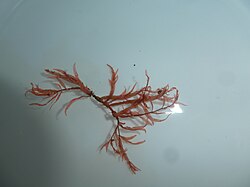Biology:Hypoglossum hypoglossoides
| Hypoglossum hypoglossoides | |
|---|---|

| |
| Scientific classification | |
| (unranked): | Archaeplastida |
| Division: | Rhodophyta |
| Class: | Florideophyceae |
| Order: | Ceramiales |
| Family: | Delesseriaceae |
| Genus: | Hypoglossum |
| Species: | H. hypoglossoides
|
| Binomial name | |
| Hypoglossum hypoglossoides (Stackhouse) Collins & Hervey
| |
Hypoglossum hypoglossoides, known as under tongue weed,[1] is a small red marine alga in the family Delesseriaceae.
Description
Hypoglossum hypoglossoides is a small red alga growing as monostromatic blades in tufts to a length of 30 cm and 0.8 cm wide. The lateral branches grow as blades which, like the primary blade, has a midrib. All the blades have a lanceolate or acute apices. All the blades lack lateral veins.[2][3]
Reproduction
The plants are dioecious. Spermatangial sori are formed on the blades on either side of the midrib. Cystocarps develop singly on the blades.[2]
Habitat
Found in the littoral and sublittoral on rock or epiphytically on other large algae.[4]
Distribution
Found on the shores of Ireland, Great Britain, Isle of Man and the Channel Islands. Further south in Spain and the Mediterranean, as well as North Carolina to Brazil.[2]
References
- ↑ Guiry, M.D.; Guiry, G.M., "Hypoglossum hypoglossoides", AlgaeBase (World-wide electronic publication, National University of Ireland, Galway), https://www.algaebase.org/search/species/detail/?species_id=155
- ↑ 2.0 2.1 2.2 Maggs, C.A. and Hommersand, M.H. 1993 Seaweeds of the British Isles Volume 1 Rhodophyta Part 3A Ceramiales. The Natural History Museum, London ISBN:0-11-310045-0
- ↑ Bunker,B F.StP.D, Brodie, J.A., Maggs, C.A. and Bunker, A.R. 2017. Seaweeds of Britain and Ireland. Second Edition. Wild Nature Press, Plymouth, UK ISBN:978-0-9955673-3-7
- ↑ Hardy, F.G. and Guiry, M.D. 2003. A Check-list and Atlas of the Seaweeds of Britain and Ireland. British Phycological Soiciety ISBN:0-9527115-16
Wikidata ☰ Q41650395 entry
 |

